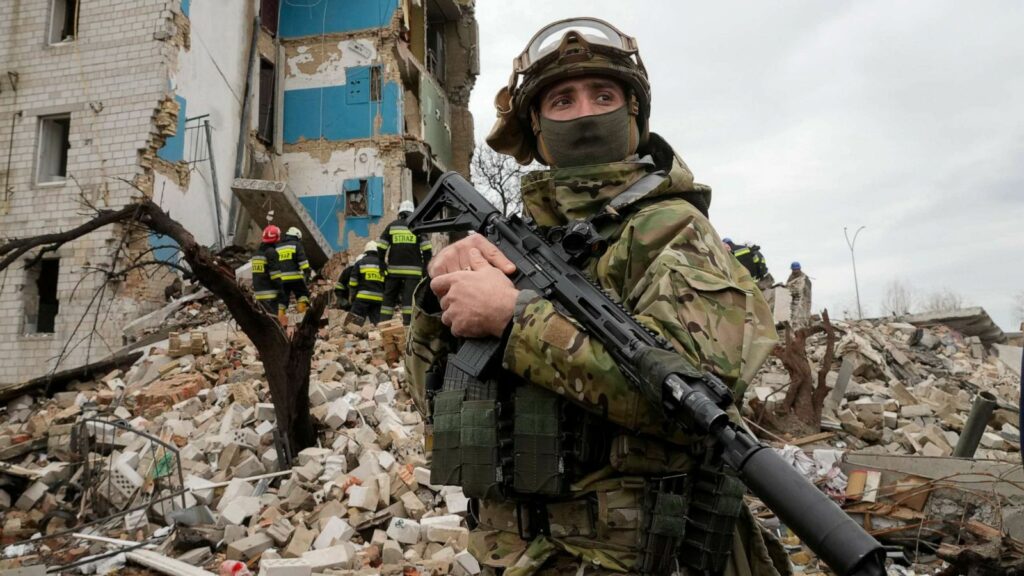Blog Post
Russia, Ukraine, and the Fogs of Culture War
By Jonathon Van Maren
While in Ukraine on a reporting trip with a fellow editor recently, I posted photos of some bombed buildings and burned-out Russian tanks to social media. Most people responded the way one usually does to evidence of tragedy. But a not insignificant percentage of right-leaning users had a knee-jerk reaction of suspicion. Don’t buy into propaganda, I was told by several. I’ve noticed this attitude proliferating almost since the beginning of the Russian invasion of Ukraine on February 24. Many conservatives are insisting, against all evidence, that what is unfolding on the ground in Ukraine somehow isn’t happening; that photographs and videos are all fakes; that all reporting is merely propaganda. My own interlocutors fell silent when I told them that I had taken the pictures myself.
In the past, horrifying imagery has transformed public opinion and produced empathy for targets of military aggression. But we are in the digital age, and the Russia-Ukraine war has been the first major conflict to unfold on social media, with a daily, nonstop firehose of information flooding our feeds. The result has been that many people have decided that it is too difficult to figure out what is actually going on, settled on instinctive scepticism, or tuned everything out altogether. After a few weeks of shock and concern about the possibility of nuclear apocalypse, folks have settled back into their respective culture war trenches and resumed fire. The Russia-Ukraine war, unfortunately, has simply become another issue that many seem to be determined to see through the lens of their pre-existing ideological arguments.
The ‘fog of war’ has long been a shorthand phrase to describe the difficulty (and at times inability) of discerning precisely what the truth is in the chaos of conflict. But what conservatives must realize is that the fog of the culture war has permeated our thinking such that we are often rendered incapable of seeing—or even thinking—clearly. Thus, clear evidence of Russian bombing of civilian areas and the perpetration of war crimes—I investigated these things on the ground—is viewed with suspicion. Many conservatives end up inadvertently playing Alex Jones to Ukraine’s Sandy Hook—and many Ukrainian Christians feel precisely the way the Sandy Hook parents felt. Your children weren’t really murdered. Your homes weren’t really bombed. In interviews, the frustration of those who endured these things was often palpable.
However, there are good reasons that so many are suspicious of what they view as the mainstream narrative. Progressives have, in many cases, created the conditions that have led to this instinctive suspicion of the mainstream media. It may be helpful to review a few of them.
Reason 1: Progressives have worked hard to make the Ukraine war about their agenda.
Progressives have worked hard to create the impression that support for Ukraine is inextricably intertwined with support for a laundry list of progressive agenda items. To cite one example of this, I refer you to a March 25 tweet by Julia Ioffe, who is an intelligent journalist with a lot of insight into Putin’s Russia. A mere month into the war, she stated that to support Ukraine was to support the LGBT agenda: “To all the people who think Tucker Carlson and Donald Trump are crazy but that trans people are made up, that ‘cancel culture’ has gone too far, that ‘men should be men and women should be women’—congratulations, you agree with Putin. You are his ideological ally.”
That sentiment is appalling to the many Ukrainian Christians suffering from the war—Christians who happen to believe that “men should be men and women should be women” but are, Ioffe would presumably admit, not Putin’s ideological allies. Many Western conservatives have succumbed to the belief that the Russia-Ukraine War is about these issues because progressives have attempted to make it about these issues (thus all the memes mocking the blue checks swapping their Ukrainian flags for ‘progress’ flags come June 1).
Ironically, it is Ioffe who is playing the role of Putin’s puppet. As I found during my research trip to Russia several years ago, Putin has worked hard to exploit Western culture wars to his own ends by highlighting the insanity of gender ideology and mocking Western decadence to shore up his Russian nationalist machismo. For Ioffe (and those of her class) to equate support for Ukraine in the face of a hostile Russian invasion to support for the transgender agenda is to amplify precisely the message that Putin wants Russians and Westerners to hear—because plenty of conservatives hearing that message are going to conclude that this war is indeed about those issues rather than the expansionist aims of an aggressive dictator. Putin would much rather we think that this war is about the LGBT agenda than his indiscriminate bombing.
READ THE REST OF THIS COLUMN HERE








